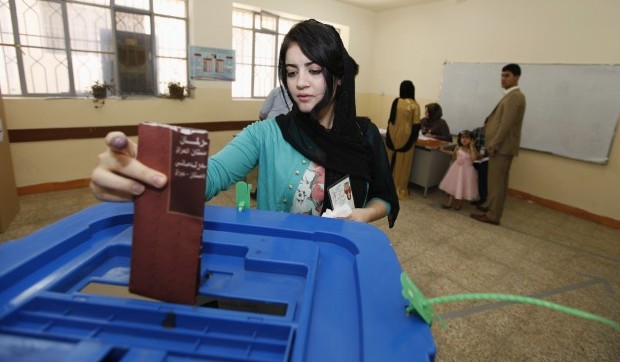
An Iraqi Kurd woman casts her vote into a ballot box during regional parliamentary elections at a polling station in Erbil, capital of the autonomous Kurdistan region, on September 21, 2013. (Reuters)
Erbil, Asharq Al-Awsat—Kurdistan’s two main Islamist parties—the Kurdistan Islamic Group and Kurdistan Islamic Union—are witnessing separate internal attempts to drop the term “Islamic” from their names in order to broaden their public appeal.
Nazim Abdulla, a senior member of the Kurdistan Islamic Group led by Ali Bapir, has recently called on the party to drop the term “Islamic” from its name in order to strengthen its presence on the political scene. He warned that the Islamist group—colloquially referred to as Komal—might be losing potential supporters due to some Kurds being intimidated by the “Islamic” nature of the group. Abdulla said it was important to clarify that the Kurdistan Islamic Group was seeking to serve the interests of all Kurds “regardless of their ideological views or background.”
Kurdistan has witnessed significant political upheaval following the 2013 parliamentary elections, with the Gorran, Movement for Change displacing Iraqi President Jalal Talabani’s Patriotic Union of Kurdistan as the region’s second party. However Kurdistan’s Islamist parties have largely remained static during this period, seeing little growth in support since the 2009 Kurdistan elections. The Kurdistan Islamic Union and Kurdistan Islamic Group were placed third and fourth respectively in the 2013 parliamentary elections, securing comparable votes to their 2009 electoral showing.
Despite widespread calls for reform in light of the recent election results, a number of Kurdistan Islamic Group members have subsequently strongly condemned Abdulla’s statements.
Bilal Suleiman, a member of the Kurdistan Islamic Group’s politburo, told Asharq Al-Awsat: “The senior member’s comments do not express the official opinion of the party; they are just his personal opinions.” Suleiman denied that the idea of dropping the term “Islamic” from the party’s name had been officially proposed to the party leadership.
“A proposition such at this should first be submitted at the Kurdistan Islamic Group’s general conference,” Suleiman said. He added that the Islamist party “emphasizes freedom of opinion and does not place restrictions on statements made by any of its senior members.”
The General Conference of the Kurdistan Islamic Group is expected to take place in July, 2014.
Kurdistan’s other main Islamist party, the Kurdistan Islamic Union, has also witnessed similar calls. A senior member of the party, Abu Bakr Ali, told Asharq Al-Awsat that he personally had proposed dropping the term “Islamic” from the party’s name at a recent party conference, adding that his proposal had failed to win majority support.
Ali said: “Islam is far too grand to be limited within the framework of a political party,” adding: “Although there is no harm in a political party taking inspiration from Islam . . . these two concepts [politics and religion] must not be confused.”
“The idea is to expand the political operation of the party, and so by deleting this characterization of the party, the party will be viewed as being more inclusive, and we will be able to attract supporters from all strata of society,” he said.
